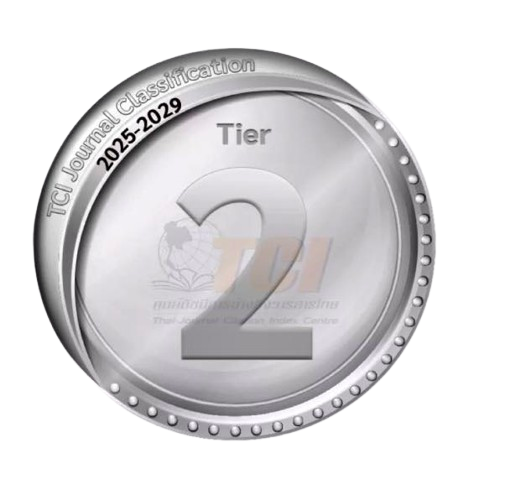Effects of the self – management on volume overload in end stage renal disease patients receiving hemodialysis
Abstract
Background: Volume overload in end stage renal disease patients receiving hemodialysis results in fluid retention in the circulatory system. Causing heart failure, shortness of breath and eventually died following. Self-management helps patients make the right changes in their health behavior.
Objective: To compare end-stage renal disease patients’ self-management behavior mean score and average pre-hemodialysis weight gain before and after being treated with self–management program for volume overload prevention.
Study design: The methodology of this study is quasi-experimental one-group design. The sample, chosen by simple random sampling, included 37 end-stage renal disease patients undergoing hemodialysis. The research instruments used in this study comprised self–management program for volume overload prevention, patient's general information record form, and questionnaire on self-management behaviors of end-stage renal disease patients. It was analyzed through descriptive statistics, Wilcoxon Signed Ranks Test, and pair t-test, and .05 statistical significance level.
Research: End-stage renal disease patients treated with self–management program for volume overload prevention had a higher self-management behavior mean score than their pre-treatment one at a statistical significance level. Their average pre-hemodialysis weight gain was found to be lower in comparison to their pre-treatment period.
Conclusion: It was suggested that self–management program for volume overload prevention should be implemented.
Keywords: end stage renal disease, self – management, volume overload
References
Csaba PK. Epidemiology of chronic kidney disease: an update 2022. Kidney Int Suppl 2022;12(1):7–11.
วาณิชา พึ่งชมพู. การพยาบาลผู้ป่วยโรคไตเรื้อรังที่ได้รับการฟอกเลือด. พิมพ์ครั้งที่ 2. เชียงใหม่: สำนักพิมพ์มหาวิทยาลัย เชียงใหม่; 2559.
วรรวิษา สำราญเนตร, นิตยา กออิสรานุภาพ, เพชรลดา จันทร์ศรี. การจัดการตนเองเพื่อป้องกันภาวะน้ำเกินของผู้ป่วยโรคไจเรื้อรังระยะสุดท้ายที่ได้รับการักษาด้วยการฟอกเลือดด้วยเครื่องไตเทียม. วารสารวิจัยและพัฒนาด้านสุขภาพ สำนักงานสาธารณสุขจังหวัดนครราชสีมา 2563;6(2):5-20.
Costa RHS, Dantas ALdM, Leite ÉMD, Lira ALBdC, Vitor AF, Silva RARd. Complications in renal patients during hemodialysis sessions and nursing interventions. J Resfundam Care 2015;7(1):2137-46.
วลี กิตติรักษ์ปัญญา, นิภารรณ สามารถกิจ, เขมารดี มาสิงบุญ. ผลของการจัดการตนเองร่วมกับการจัดการทางคลินิกต่อพฤติกรรมการจัดการตนเอง น้ำหนักที่เพิ่มขึ้น และภาวะความดันโลหิตต่ำขณะฟอกเลือดด้วยเครื่องไตเทียม. วารสารสภาการพยาบาล 2565;28(2):109-22.
ธิดารัตน์ เพรชชัย, ศรีสุดา มิ่งแก้ว, เยาวลักษณ์ นนทภา, วไลพร คำทอง, พรทิพา โฮมราช, อัญชลี ปิยลังกา, และคณะ. ผลของการใช้แนวคิดการจัดการตนเองต่อพฤติกรรมการดูแลตนเองในการควบคุมภาวะน้ำเกินของผู้ป่วยโรคไตเรื้อรังที่เข้ารับการรักษาด้วยการบำบัดทดแทนไต ด้วยการฟอกเลือดด้วยเครื่องไตเทียม โรงพยาบาลสิริกิติ์. วารสารแพทย์นาวี 2561;45:106-20.
Kanfer HF, Gaelick-Buys L. Self-management methods. In FH Kanfer, AP Goldstein (Eds.), Helping people change: A textbook of methods (p. 305-60). New York: Pergamon press; 1991.
Slensisck N, Pienkos S, Sun S, Doss-McQuitty S, Schiller B. The chronic disease self-management program-A pilot study in patients undergoing hemodialysis. Nephrology News & Issues 2015;29(4):30 -2.
Chorina MN, Anggri NZ. Social support and self-management among end-stage renal disease patients undergoing hemodialysis in Indonesia. J Public Health Res 2022;11(2);1-5.
สาวิกา อร่ามเมือง, กรองกาญจน์ ลังกาศ, สุวิมล กิมปี, อรวมน ศรียุกตศุทธ. ปัจจัยทำนายพฤติกรรมจำกัดน้ำของผู้ป่วยไตวานเรื้อรังที่ฟอกเลือดด้วยเครื่องไตเทียม. วารสารพยาบาลศาสตร์ 2557;30(3):74-81.




